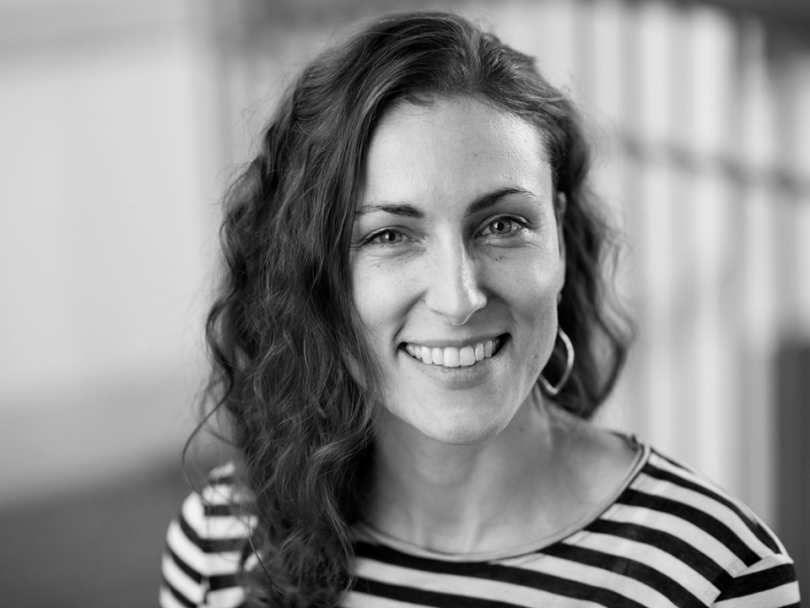While it may be a tough pill to swallow, it’s no secret that the technology industry has a history of excluding women. Fortunately, today, many companies, firms and agencies are making it their mission to close the diversity gap in tech. Yet, these initiatives would go nowhere were it not for the determination of female technologists themselves, who are blazing new trails and clearing a path for future female tech leaders.
Built In NYC spoke to female technologists from some of New York City’s fastest-growing companies to learn more about their unique journeys.

Since its 2010 founding, Movable Ink has pioneered cutting-edge, contextual email marketing campaigns for a variety of high-profile clients. The company’s Head of Design & UX, Andrea Mignolo, shared her journey to her current role, and how Movable Ink has created an awesome environment for women in tech.
What are some unique challenges you have faced as a woman in tech? What advice would you give to other women who may be facing these same challenges?
For most my career I've worked in smaller companies that tended to be male-dominated. For a long time, I thought I had to be one of the boys, which often meant going along with off-color commentary or jokes that really didn't sit well with me. I've also been in environments that value aggression and conflict as a means of seeking out truth. For anyone who doesn't operate this way it can be hard to feel included if you aren't shouting along with everyone else.
I think the biggest challenge for me has been being someone who is outside the typical tech leadership archetype. I remember stepping into my first leadership role and getting passive-aggressive questions about whether I really wanted to do this, the implication being that I probably shouldn't. When I tried to emulate what I saw around me the results were less than stellar. But when I started to approach leadership from a place that was authentically me, everything clicked.
How does your current company support women in the tech space?
Movable Ink supports women in the tech space in several ways. Representation is an important one, and 35 percent of our executive team is women. It's important to see women in prominent leadership roles and I think Movable Ink is doing well there.
We have a Movable Pink, our women's employee network and advocacy group that organizes a range of events to explore, discuss, and take action on issues we care about, and we have an internal women's mentoring network that pairs up people in senior roles with people who are a few years into their careers for coaching and advice.
What are your predictions for the future of women in tech in general?
As a country, I think we're starting to slowly acknowledge how endemic institutionalized racism and sexism are. Not just that it exists, but what it looks like, why it's not okay, and what to do about it. It's about women, it's about African Americans, it's about Latinx, it's about LGBTQI. As these conversations are happening on a macro-level, we're also seeing the ramifications of movements like #MeToo in industries like media and tech.The tech world doesn't feel the same as it did 10 years ago; there are more women founders, executives and technical leaders than any time in the past.
What makes me even more optimistic is talking to girls and young women who are interested in science and technology. I think programs like #builtbygirls, Women Who Code, and the New York Academy are doing a wonderful job of connecting them with companies, experiences, and mentors who can facilitate additional learning and growth.

TheSkimm has built its brand creating a news site and app specifically for women on the go, so it’s no wonder the company upholds the values of strong female leadership. Head of Product Dheerja Kaur told Built In NYC how her company inspires change across the industry.
What are some unique challenges you have faced as a woman in tech? What advice would you give to other women who may be facing these same challenges?
Imposter syndrome is well-documented, but it took me a while to realize it was something I felt through much of my early career as a woman engineer in a male-dominated environment. I realized in the back of my head I had this vision of someone who could do my job better — they were usually white, male and had confidence through the roof.
Early in my engineering career I was lucky to have a strong support system to push me past that imposter syndrome — I had a wonderful team around me, two close women engineering mentors, and a series of extremely supportive managers who were my personal cheerleaders and advocates. Develop a set of strong, long-lasting relationships with mentors who will guide you along the way in your career, and prioritize teams and managers who will be your advocates and elevate you to be your best.
How does your current company support women in the tech space?
A big part of why I joined theSkimm was the opportunity to be at a woman-founded and woman-led company. Our founders Carly and Danielle have taken this company to new heights against all odds, and they've cultivated a truly special company culture that empowers its employees. We've introduced a series of benefits — generous parental leave policy and partnering with Carrot Fertility for subsidized family planning and fertility services — that tangibly show the level of support women have at the company to succeed without needing to make tradeoffs.
What are your predictions for the future of women in tech in general?
The industry has made some strides in the last couple years towards acknowledging and discussing the very serious systematic problems that prevent women from succeeding. We still have a long way to go, and one of the next big steps is for companies to take this as a business and company-wide objective, not just a diversity or HR problem. At this stage, we're seeing more dialogue, but not enough hard decisions and actual action being taken at the right levels. It has to start from the top with more representation and serious efforts from leadership teams.

Plaid partners with companies around the world to help them better understand and serve their customers. Plaid analyzes financial data from more than 14,000 institutions and transforms it into key insights for its clients. Internally, VP of Client Operations Nicole Newlin explained that, with a team that is 40 percent women, her company is leading the wave of change.
What are some unique challenges you have faced as a woman in tech? What advice would you give to other women who may be facing these same challenges?
Not all people in tech companies are in technical roles, and as a woman in this position, it can be difficult to lead and take full ownership of your role when surrounded by many others with deep technical expertise. My career has focused on project management and the team leadership side of tech. As a result, I’ve definitely had moments when I knew much less about the technical aspects of a project than my colleagues, and I felt uncomfortable leading the team. It’s especially easy to feel this way when you’re new to a company or just beginning a career.
For other women in the same position, I would advise them to know their role at the firm and make sure everybody else is aware of it as well. Even if it is not technical, you were hired for a reason and you know the best way to execute in the position and how it serves the team.
How does your current company support women in the tech space?
Plaid is 40 percent women, and the management team works to continue hiring women, supporting their career development and promoting them to leadership positions. I’ve worked with many tech companies, and Plaid truly strives to create an environment that is inclusive of women. On the teams I lead, the number of female managers outnumber male managers.
Currently, we have informal communication channels for women to discuss their experiences and, potentially, raise issues specific to women. As the company continues to grow, we’re in the process of implementing employee resource groups.
What are your predictions for the future of women in tech in general?
Of course, the number of women in tech is only going to increase across verticals and positions. I believe we’ll see many more women move into leadership roles. Tech companies have less of the hierarchical structure that dictates career paths in other industries, namely financial services.
With the cross-functional nature of tech, women have more opportunity to be visible and demonstrate their skills to a broader range of people, who will notice it and advocate for their advancement. In other industries, women’s talent is much more susceptible to getting lost or hidden behind lines of managers who may never recognize their value.

Real estate platform Nooklyn helps individuals find apartments, rooms and roommates across Manhattan and Brooklyn. Vice President of Revenue Stephanie Malan explained to Built In NYC how the platform is quite literally designed to keep women safe, and how that same mentality influences the company culture.
What are some unique challenges you have faced as a woman in tech? What advice would you give to other women who may be facing these same challenges?
have worked in many male dominated industries and one of the challenges I had to face in my early 20s was having imposter syndrome. I was constantly doubting my accomplishments and my ability to take risks and voice my opinions. You really have to learn to shoot down these thoughts as quickly as possible. As soon as I started making bold moves, things started changing. I realized there are many ways that can lead you to success and a fulfilling career and work environment. Don’t get stuck in taking traditional paths. Try new things, fail and try again.
I also had to teach myself how to negotiate and use leverage in conversations with senior management. Being confident in what you have to offer important. Having mentors also helped me a lot. They will share the experiences you need to make better decisions and will point out strengths and weaknesses you were not aware of.
How does your current company support women in the tech space?
I never worked in an environment that supports women as much as Nooklyn does — it’s part of our culture. 65 percent of our customers are young women looking for a safe marketplace to find an apartment, room or roommate. One of our founders and the designer of our platform, Moiz Malik, built in a security system to protect women from being harassed when looking for a roommate online.
Our recruiting efforts focus on creating equal opportunities for women and men internally. We make sure women are represented at every level in the company from leading management positions to our software engineers. When I form teams of leasing agents to work on projects, I pick a diverse team of people and try to balance out the number of women and men assigned on every project as well.
What are your predictions for the future of women in tech in general?
Progress happens every day. More and more women are being given leadership opportunities in tech and finding the courage and resources to launch their own ventures. Education is fundamental and many improvements can be made to arm women with better tools in the workplace.








